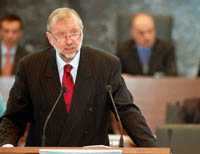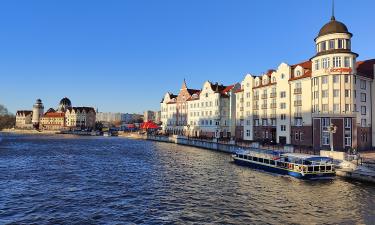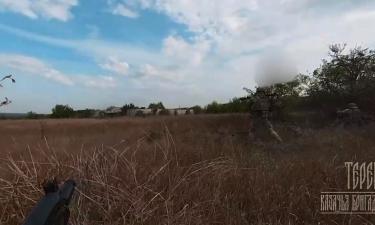Slovenia prepares "for all possibilities" in Kosovo's future

Slovenia is going to take over the EU presidency in January, and it sees keeping Europe united over Kosovo as a key challenge, the country's foreign minister said Thursday.
Slovenia was considering ways for dealing with the issue within the EU and preparing "for all possibilities," if and when it is granted independence, Slovene Foreign Minister Dimitrij Rupel said while visiting Kosovo.
Serb officials, who are adamantly opposed to Kosovo's independence, are facing a Dec. 10 deadline for results from their talks with Kosovo's ethnic Albanian leadership, who demand secession from Serbia.
Rupel said the European Union should be united in its stance on Kosovo's final status, and that Slovenia in the presidency would need to ensure differences did not escalate.
"The problem of unity should be taken very seriously," Rupel said after meeting the top U.N. official in Kosovo, German diplomat Joachim Ruecker.
Some EU members with separatist movements of their own _ including Spain, Greece, Romania and Cyprus _ have voiced discomfort with the possibility of Kosovo becoming independent, a solution supported by the United States and EU heavyweights. Other European countries have misgivings about recognizing a new state if the U.N. Security Council has not done so. Security Council recognition could be blocked by veto-holding Russia, a staunch Serb ally that has opposed independence for Kosovo.
Slovenia was ready, however, to take responsibility for bringing the EU's 27 member nations to consensus if the Kosovo talks failed to reach a final agreement by the end of the year, Rupel said.
"We are in the drivers seat as far as the composition of this unity," Rupel said.
"We should try to be as energetic as possible. I think we can succeed," he said.
During his visit to Kosovo, Rupel planned to meet ethnic Albanian leaders as well as representatives of the province's minority Serb community.
He also was scheduled to visit Slovenian soldiers serving with the NATO-led peacekeeping mission in Kosovo.
Representatives of the so-called troika - the U.S., Russia and the European Union - have been mediating talks seen as a final attempt at brokering a compromise, after previous attempts collapsed earlier this year, when Serbia and Russia rejected a U.N.-brokered plan to grant Kosovo internationally supervised independence.
The EU has supported the plan, which was drafted by former Finnish President Martti Ahtisaari. It provides broad rights for the province's minority Serbs, but says Kosovo should separate from Serbia and be supervised by an EU-led international presence.
Ethnic Albanian leaders have threatened to declare independence unilaterally after Dec. 10, as prospects for an agreed solution remain slim.
Serbia has warned unilateral moves that curb its formal sovereignty over the province would risk the region's stability.
A U.N. mission is in charge of running the province, although daily affairs are run by locally elected institutions dominated by ethnic Albanians.
Subscribe to Pravda.Ru Telegram channel, Facebook, RSS!




